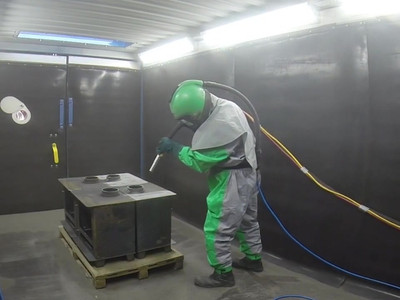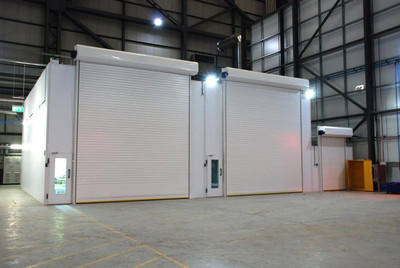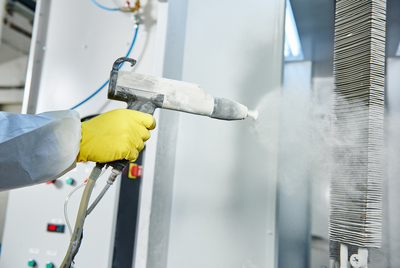Blast Facility Servicing
Blast facilities require dedicated maintenance and upkeep. They undergo significant operational stresses, which can induce wear on critical systems and components over time, potentially causing them to fail. Ensuring your blast facility is properly maintained is essential for remaining HSE compliant and mitigating losses incurred due to downtime.
With nearly 50 years of experience in delivering and supporting blast facilities, our expert team of technicians and engineers can provide a wide array of services, such as inspection, testing, servicing, and emergency repair of all blast facility systems and components. Additionally, we ensure compliance by testing and maintaining blast facilities according to the latest legislative and regulatory standards.
We offer total care and technical support for blast facilities and their critical systems across the UK.
- RPE servicing and testing for breathing air filtration units
- Compressor maintenance and testing
- Spray equipment servicing and repair
- Spray equipment pressure testing, mechanical testing, and visual inspection
- Dust arrestor LEV testing, maintenance, and repair
- Spray facility maintenance, servicing, and emergency repair
Scheduled maintenance and calibration
Maintaining a blast facility is crucial for compliance with legislation and regulations (HSG258 - Controlling airborne contaminants at work). Preventative maintenance and inspection are necessary to ensure your blast facility is fit for use and, once worked on, has up-to-date test documentation. Our technicians and engineers adhere to regulated inspection procedures to guarantee that blast facilities, including their critical systems and components, are safe and meet legal standards.
Our team, trained to the highest standards, ensures that your blast facility is properly maintained and reliable when you need it most.
Recommended Inspection Schedules
Inspection, servicing, and testing are vital for workplace safety and efficiency. Whatever your requirements, thanks to our exacting inspection and testing procedures, you can trust that you’re in safe hands.
Airline Breathing Equipment
As per HSE regulations, breathing air tests must be performed every 400 hours or every three months, whichever occurs first. These breathing air tests are mandatory for manufacturers and contractors operating in hazardous environments. Inhaling compromised air from an airline-fed blast helmet can pose severe health risks. Moreover, it is the employer's obligation to ensure these tests are conducted to protect their employees. You can arrange a breathing air test here.
Gas Detectors
Gas Detectors Gas monitors, such as the GVS RPB GX4, need calibration after extended use, typically between 6 months to 2 years, depending on the specific model. Refer to the manufacturer’s guidelines to determine your monitor's calibration schedule. If it fails a bump test, send it to us for servicing.
Air Compressors
For best practice, air compressors should be serviced annually or every 2,000 hours, whichever comes first, determined by activity levels. Airblast can offer servicing for a variety of brands, including Hertz, Atlas Copco, and Abac.
Gas detectors
Gas monitors, like GVS RPB GX4, require calibration after prolonged usage. This can be anywhere from 6 months to 2 years, depending on the gas monitor. Check the manufacturer to find out how often yours needs calibration, or if it fails a bump test, send it to us for service.
LEV Testing and Inspection
As per HSE legislation, employers must maintain and inspect their LEV system’s performance and conduct thorough examinations of it. Moreover, the operator is responsible for making daily checks and reporting faults. Safety officers or workers’ representatives and supervisors must make weekly or monthly checks.
Additionally, managers must identify problems, receive regular reports from the supervisor, and be responsible for maintenance and testing. Works engineers should repair faults, carry out maintenance, and arrange a thorough examination.
LEV testing should be performed every 14 months, and to reiterate, they are a legal requirement for compliance with health and safety standards in the UK. Airblast’s engineers are fully equipped to conduct these evaluations and provide test reports.
Grit blasting machines (blast pots)
Grit blasting machines must be pressure tested every 22 months per HSE guidelines. Worn pressure vessels pose a significant danger and require inspection and testing to ensure the safety of operators and those nearby. For best practice, operators should conduct regular inspections, with specific checks performed daily and weekly. Whether on-site or delivered to us, Airblast engineers can conduct these examinations; you can arrange a pressure test here.
Expert Support
Our expert team of engineers and technicians has the relevant skills and knowledge in all aspects of abrasive blasting, including testing and servicing. To prove their competence, our team undertakes vigorous training and regular audits. For additional reassurance, all our technicians and engineers have full support from our technical teams.
Call us today on 01778 560650 to book your servicing, inspection, or test; alternatively, email us below.




